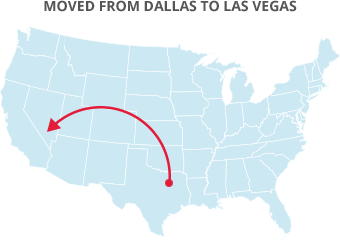
You’ve got a business to run. And now you’ve got to run it while you’re moving it from one location to another! How do you keep the business growing and the profits flowing while your furniture’s going out the door? That’s the “million dollar” question of office relocation! Answer it incorrectly, and your productivity and profits will go out the door with the furniture.
At A-1 Freeman, we’ve got a correct answer for you – one that’s predicated on helping you avoid 8 mistakes that we, as
office relocation specialists, find all too commonly made:
- Not Planning Ahead. As soon as you know you’ve got to move, that’s when you ought to start planning for it. Sadly, too many companies get started on their office relocation planning a little too late. Too late for what, you ask? Well, too late for moving companies and other vendors to put together a decent proposal for you, let alone properly deliver the goods and services you purchase from them. Remember: too little time often translates into too many mistakes. Let the size of your company and the complexity of your move – i.e., the number of steps that must be completed before other steps can be started – guide you in determining how soon is soon enough.
- Not Checking Out Your Mover Thoroughly. Office relocations are tricky. You need a mover who knows how to deal with office furniture and modular systems, computer systems and networking, office equipment, machinery, and hardware, cabling, phone systems, security systems, building permits, and ... that’s just the short list! So, whatever moving companies you’re considering, make sure they’re legitimate. Check https://ai.fmcsa.dot.gove/hhg/search.asp to see, first of all, that they’re U.S. Department of Transportation (DOT) licensed and insured, especially for interstate commerce. Check the reviews at bbb.org. to find out if any complaints have been lodged against them with the Better Business Bureau. And, if at all possible, check with other businesses who’ve used them to see how well they lived up to their contractual promises. It’s also a good idea to inquire about their moving crews – whether they’re full-time employees or temps, whether they’ve been background checked and drug tested, and whether they follow conventional chain-of-custody procedures.
- Not Coordinating and Communicating Properly with Your Mover. Your office relocation manager must work with the project manager your moving company has assigned to see that your internal team and the moving company’s team are in perfect sync. Any changes in schedule must be properly relayed to everyone involved, lest one delay lead to others and cause all sorts of glitches and cost overruns.
 Not Committing Enough Internal Staff to Your Move. The complexity of any office relocation pretty much dictates that you recruit the help of employees from within your company. Look for people in each department who understand their department’s needs thoroughly and have access to relevant company records. That may not always be the department head! In fact, you’re often better off soliciting the help of experienced but non-managerial staffers, as they’re more likely to follow your relocation manager’s direction without argument.
Not Committing Enough Internal Staff to Your Move. The complexity of any office relocation pretty much dictates that you recruit the help of employees from within your company. Look for people in each department who understand their department’s needs thoroughly and have access to relevant company records. That may not always be the department head! In fact, you’re often better off soliciting the help of experienced but non-managerial staffers, as they’re more likely to follow your relocation manager’s direction without argument.- Not Keeping to Schedule. It’s not often the case that an office relocation schedule slows down. Sure, various steps can be delayed for this or that reason. But what typically happens then is that the schedule gets compressed. And that typically happens because the planning got started too late. And what happens when you try to make up for lost time? More people from your end and the mover’s end are assigned more overtime hours. Everybody starts getting in everybody else’s way. Things get sloppy. Mistakes are made. And who pays for all this? Yep. Better to draft a reasonable schedule up front and stick to it.
- Not Budgeting Enough for Your Move. Admittedly, it’s hard for any company that hasn’t gone through a relocation before to know exactly what its move will end up costing. To leave that cost to fate, though, or to budget for it inadequately is a big no-no! At the topmost level, you need to budget for recurring real-estate costs, soft-dollar expenses for, say, employee relocation and training, capital expenses such as new furniture and office equipment purchases, moving expenses, and consulting expenses for such things perhaps as interior design and engineering. The more of your needs you take into consideration up front, the more manageable the expense of your office relocation will be.
- Not Having Enough Coverage. If you’ve chosen a professional relocation company of any repute, the risk of property damage is minimal. Still, you need to be prepared. Ask your mover about the coverage options they offer and choose the most appropriate for your business.
- Not Remembering to Back Up Your Data. No need for horror stories here. Suffice it to say that during your office relocation, your company’s material records should be backed up digitally, wherever possible. Those that can’t be digitized should be stored securely in a warehouse. And your digital data should be backed up in the cloud. Historically, losing such data or suffering its damage isn’t a common occurrence. But do you really want to risk it? Then, by all means, back it up!
A big way to avoid these kinds of mistakes – or to compensate for them effectively – is to go with a moving company that has a proven track record of successful office relocations. May we recommend A-1 Freeman? Check out our credentials as we suggest above. Then check out our
office relocation services and ...
Request a free quote



 You’ve got a business to run. And now you’ve got to run it while you’re moving it from one location to another! How do you keep the business growing and the profits flowing while your furniture’s going out the door? That’s the “million dollar” question of office relocation! Answer it incorrectly, and your productivity and profits will go out the door with the furniture.
You’ve got a business to run. And now you’ve got to run it while you’re moving it from one location to another! How do you keep the business growing and the profits flowing while your furniture’s going out the door? That’s the “million dollar” question of office relocation! Answer it incorrectly, and your productivity and profits will go out the door with the furniture. Not Committing Enough Internal Staff to Your Move. The complexity of any office relocation pretty much dictates that you recruit the help of employees from within your company. Look for people in each department who understand their department’s needs thoroughly and have access to relevant company records. That may not always be the department head! In fact, you’re often better off soliciting the help of experienced but non-managerial staffers, as they’re more likely to follow your relocation manager’s direction without argument.
Not Committing Enough Internal Staff to Your Move. The complexity of any office relocation pretty much dictates that you recruit the help of employees from within your company. Look for people in each department who understand their department’s needs thoroughly and have access to relevant company records. That may not always be the department head! In fact, you’re often better off soliciting the help of experienced but non-managerial staffers, as they’re more likely to follow your relocation manager’s direction without argument.